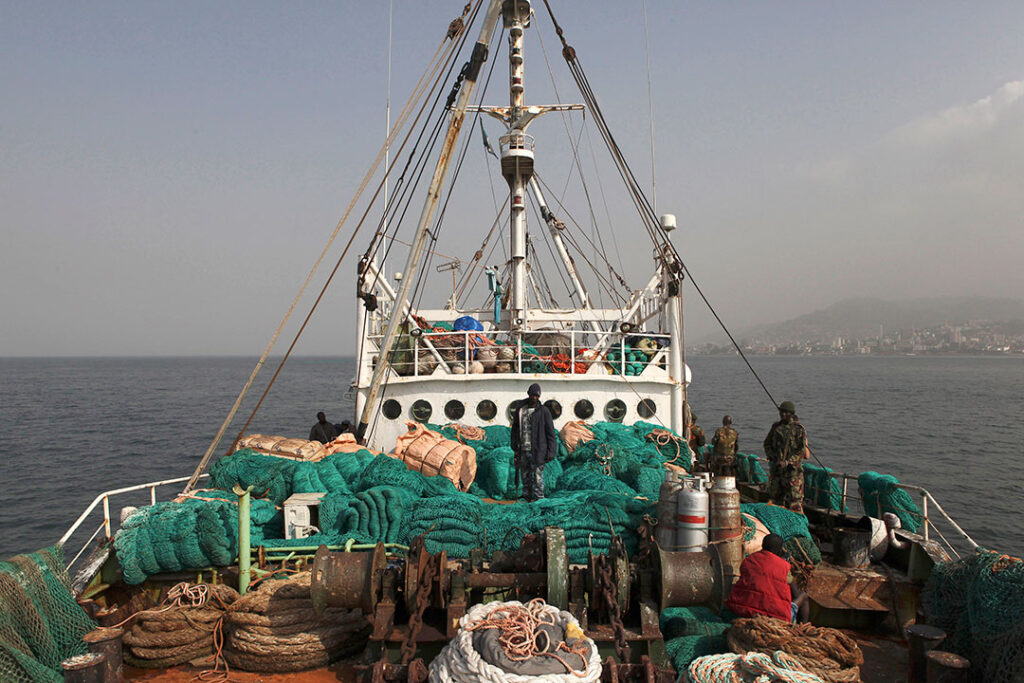ADF STAFF
Failing to regulate large fishing fleets puts small-scale fisheries in Africa at risk, according to research by the University of St. Andrews in Scotland.
Distant-water fishing fleets (DWF) from other nations catch far more fish than Africa’s artisanal fishermen and are a much greater threat to fish stocks, the report found. This is especially true when industrial vessels catch fish illicitly through bottom trawling, fishing with explosives, and using prohibited nets and other gear.
Closed fishing seasons and fishing arrangements made with other countries lead to fisheries governance challenges, dwindling fish stocks and a rise in sea crimes, researchers found.
The measures, intended to protect small-scale fisheries, actually benefit industrial fishing fleets, Ifesinachi Okafor-Yarwood, of the School of Geography and Sustainable Development at the University of St. Andrews, said in a story on the university’s website.
“The small-scale fisheries support millions of jobs and are better adapted to meet the continent’s nutrition and socio-economic security,” Okafor-Yarwood said. “For the fisheries sector to contribute to the sustainable development of Africans, states must redirect governance towards regulating the industrial sector, emphasizing equitable access for the small-scale fisheries whilst prioritizing ecological sustainability.”
Study co-author Edward H. Allison, executive director of WorldFish, a nonprofit research institute, said securing small-scale fisheries is an “important task for fisheries governance on the continent.”
“This can be achieved by both prioritizing small-scale fisheries development and directing regulatory efforts to the industrial and distant water fleets,” he said on the university’s website. “At the moment, as our paper shows, it’s too much the other way round.”
DWF fleets that engage in illegal tactics have ravaged West African waters for decades and have more recently targeted East Africa. China is the world’s worst illegal, unreported and unregulated (IUU) fishing offender, according to the IUU Fishing Index.
A separate study published by the research journal Fish and Fisheries used automatic identification system (AIS) satellite data collected by Global Fishing Watch to document foreign and African industrial fishing in the continent’s exclusive economic zones (EEZs).
Many of the EEZs in West Africa were fished by “a large number of countries,” the study found, and the EEZs of Western Sahara and Mauritania were targeted by the highest number of foreign countries.
The research highlighted the importance of international cooperation to address fisheries challenges, said study co-author William Cheung, professor at the Institute for the Oceans and Fisheries at the University of British Columbia.
“We demonstrate the importance of having accessible data, including those from new technology, to generate knowledge that is necessary to address these challenges,” Cheung said in a story on the University of Delaware’s website.
AIS data can show where and how long industrial trawlers fish, but fisheries officials depend on a vessel’s operators to report what they catch. Throughout Africa, DWFs commonly underreport their catch to avoid fines and penalties.
The research first published by Fish and Fisheries used Namibia as a case study. The country requires fleets fishing in its EEZ to land their catches in domestic ports, but not all do. Although AIS showed 20 fishing trawlers in Namibian waters, some reported catching no fish at all.
Mi-Ling Li, assistant professor at the University of Delaware’s School of Marine Science and Policy and lead author of the paper, characterized Namibia’s maritime surveillance efforts as “relatively good.”
“But even with those regulations, we find a big discrepancy in who reported fishing and catch there and who we detected by AIS,” Li said on the university’s website. “This is a big issue with regards to illegal fishing in African waters.”

